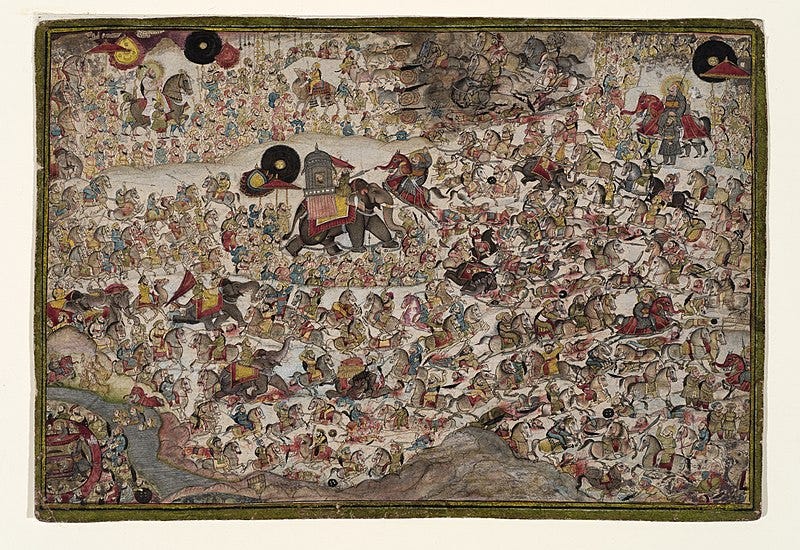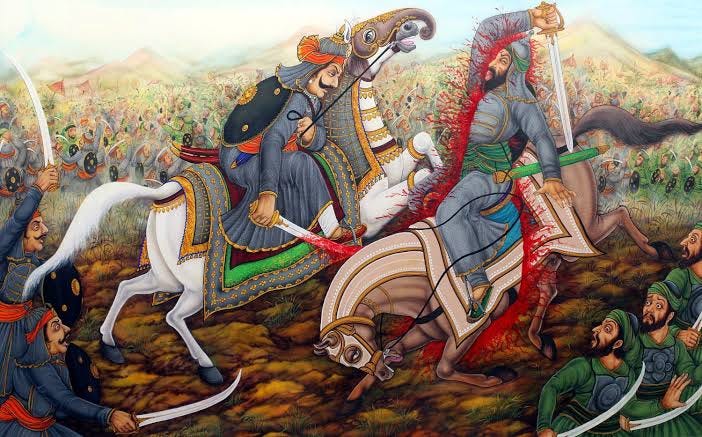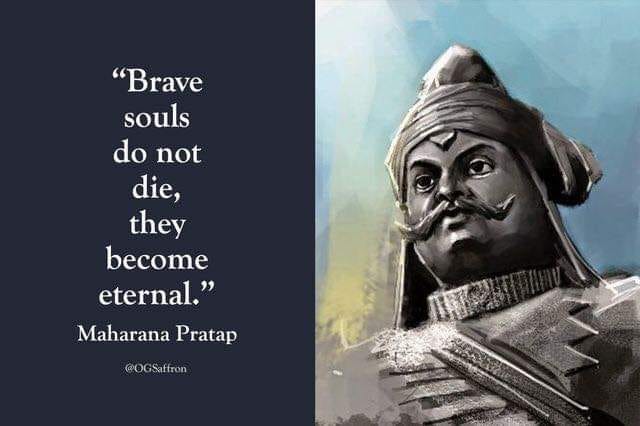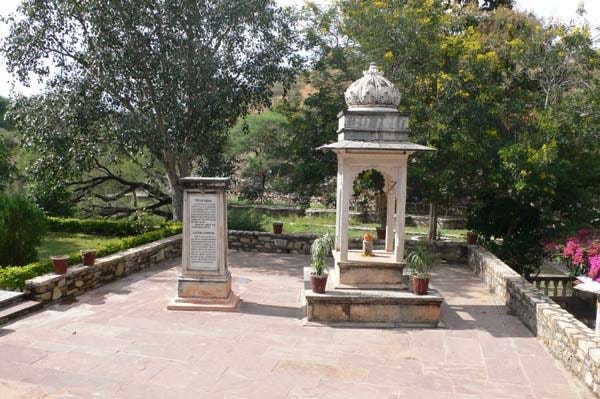The Valour of Maharana Pratap: From Haldighati (1576) to Dewair (1582)
Our schoolkids are taught about the valiant fight of Maharana Pratap in the Battle of Haldighati (1576), but how many know of his triumphant and decisive victory at the Battle of Dewair (1582)?

The Battle of Haldighati (1576): A Symbol of Resistance
The Battle of Haldighati, fought on June 18, 1576, between Maharana Pratap of Mewar and the Mughal forces led by Raja Man Singh I of Amber, stands as a legendary chapter in Indian history. Set in a narrow mountain pass near Gogunda, Rajasthan, named for its yellow, turmeric-like (haldi) rocks, the battle was a testament to the indomitable spirit of the Rajputs. Despite facing an army four times larger, Maharana Pratap displayed extraordinary valour and tactical brilliance. Though the Mughals claimed a technical victory by holding the battlefield, they failed in their ultimate goal of capturing the Rana or breaking Mewar's defiance. Pratap's strategic retreat, safeguarded by the heroic sacrifice of his commander Jhala Man Singh, preserved his fight for freedom and set the stage for future resistance.
Maharana Pratap’s Resilience and Guerrilla Warfare
Following the battle, Maharana Pratap adopted guerrilla warfare tactics to resist the Mughals. He continued to operate from the rugged terrain of the Aravallis, striking Mughal outposts and disrupting supply lines. His unwavering defiance ensured that Mewar remained unconquered, even as other Rajput kingdoms succumbed to Mughal dominance.

The Decisive Victory at Dewair (1582)
The Battle of Dewair, fought in 1582, stands as a pivotal moment in the history of Rajput resistance against Mughal dominance. This lesser-known yet monumental confrontation saw Maharana Pratap achieve a decisive victory over the Mughal forces, marking a significant turning point in the struggle to reclaim Mewar's sovereignty.
Historical Context and the Battle
The battle occurred during a period when Maharana Pratap was steadfastly resisting Mughal efforts to subjugate Mewar. The Mughal commander Bahlol Khan, a trusted and powerful general under Emperor Akbar, led the opposing forces. Maharana Pratap, known for his strategic acumen and martial valour, personally commanded his troops, rallying them to a stunning triumph over the Mughals.
The outcome of this battle was extraordinary. Maharana Pratap not only defeated the Mughal army but also forced the surrender of 36,000 Mughal soldiers. Furthermore, all 36 Mughal garrisons stationed across Mewar were permanently dismantled, effectively liberating the region from Mughal control.
The Legend of Bahlol Khan
One of the most famous episodes associated with the Battle of Dewair is the account of Maharana Pratap's confrontation with Bahlol Khan. According to historical and cultural narratives, Maharana Pratap is said to have slain Bahlol Khan and his horse with a single stroke of his sword. While this tale has become an enduring symbol of Maharana Pratap's martial prowess, it is essential to approach such dramatic depictions with a critical lens. The documented death of Bahlol Khan at Pratap’s hands is undeniable, but the exact details may have been embellished through oral traditions and artistic representations. Nonetheless, this story holds a significant place in Indian cultural memory, epitomizing Rajput valor and resistance.
Consequences of the Victory
The victory at Dewair had far-reaching consequences for Mewar. Maharana Pratap successfully recaptured key territories, including Udaipur, Gogunda, and Mandal. This restoration of Mewar's territorial integrity not only bolstered the morale of its people but also revitalized its economy and administration. Pratap's leadership inspired widespread loyalty, prompting displaced citizens to return and rebuild their lives under his rule.
Symbol of Resistance
The Battle of Dewair is often overshadowed by the more widely known Battle of Haldighati, but its importance cannot be overstated. This decisive victory demonstrated that even a smaller, determined force could stand against a vastly superior empire. Maharana Pratap's triumph at Dewair is a testament to his resilience, strategic brilliance, and unyielding commitment to his kingdom’s freedom.
The Battle of Dewair remains a defining chapter in Indian history, symbolizing the enduring spirit of defiance and independence. It underscores Maharana Pratap's place not just as a warrior-king but as a beacon of hope for all who value freedom and sovereignty.
Continued Resistance Against the Mughals
Despite his successes, the Mughal emperor Akbar continued his campaigns against Maharana Pratap. However, these efforts bore little fruit. Akbar personally led a campaign in Mewar but was forced to retreat after six months. Subsequently, his generals, including Jagannath Kachhwaha, also failed to subdue the defiant Rana.
The Final Years and Legacy of Maharana Pratap
Maharana Pratap passed away on January 19, 1597, due to injuries sustained during a hunting expedition. Even on his deathbed, he urged his son, Amar Singh I, never to submit to the Mughals. His death marked the end of an era of unyielding resistance, but his legacy as a symbol of courage and independence endured.
Amar Singh I and the Treaty with the Mughals
Maharana Pratap's son and successor, Amar Singh I, continued the fight against the Mughals, engaging in 17 battles. However, faced with an economically and militarily depleted state, he eventually signed a treaty with Emperor Jahangir in 1615. The treaty allowed Mewar to retain considerable autonomy, with specific terms ensuring no matrimonial alliances with the Mughals and limited fortifications of Chittor.
A Dynasty of Defiance
Maharana Pratap's legacy extended through his descendants. While the treaty of 1615 marked the end of active hostilities, Mewar continued to uphold its independence and traditions. Subsequent rulers maintained this delicate balance until the arrival of the British, which ushered in a new phase of Mewar's history, till its integration into the Indian Union, after Independence in 1947.
A Call for Reevaluation of Historical Narratives
Despite its significance, the Battle of Dewair is scarcely mentioned in our school textbooks. Instead, historical defeats, such as the Battle of Haldighati, are often embellished and celebrated in ways that obscure the true narrative. While it is important to honour the sacrifices of our ancestors, it is equally crucial to highlight their definitive victories. The neglect of battles like Dewair reflects a broader issue in the way Indian history is taught, warranting a comprehensive reevaluation of our educational materials. By doing so, we can ensure that our history accurately reflects not only the struggles but also the triumphs that shaped our nation.
Maharana Pratap: A Timeless Inspiration
Maharana Pratap’s life epitomizes the ideals of valour, independence, and unwavering commitment to one’s homeland. From his tactical retreat at Haldighati to his triumphant victory at Dewair, he remains a timeless inspiration for generations. His story is not just a chapter in Indian history but a testament to the enduring spirit of resistance against oppression. Recognizing and teaching such moments of triumph can instill pride and resilience in future generations, honoring the legacy of those who fought for freedom.






I was known as nerd who read history books cover to cover in school , never read about it in my school text books. Murder of history , nothing less.
Thanks for the education, inclusion of such battles in educational discourse should be mandatory to preserve and honor the full scope of India’s historical narrative.
Hope someone from Bollywood with likes of Ashutosh Gawarikar will take notice of your write up.
Thank you
🙏🏻🙏🏻🙏🏻🇮🇳🇮🇳🇮🇳👍🏻👍🏻👍🏻